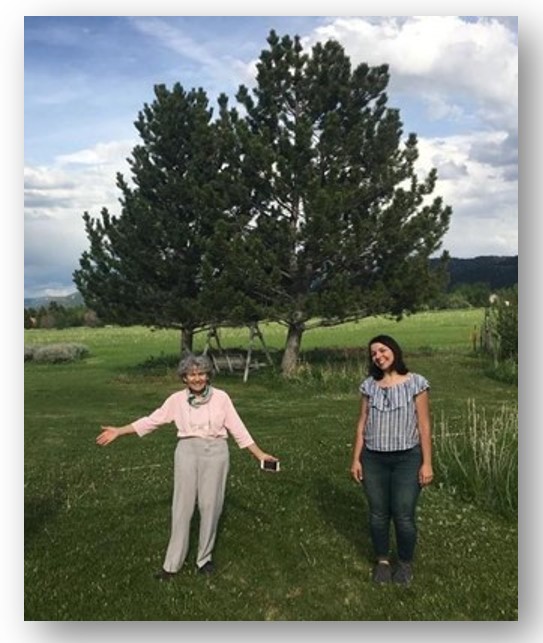Lead by Courage, My Inspiring Women in Science: Florence Dunkel
 I am Burcu Alptekin. I am a first-generation college graduate and international woman in science, currently located at the University of Wisconsin-Madison. It has been a roller-coaster ride for me to get my PhD and stand here where I am at today. Along the journey, I met with many women scientists who were a great inspiration for me, gave me the courage to continue on my path, shared their wisdom—both in life and science—and supported me along the way. Today, I would like to highlight one of these special women who was a great example and deeply influenced me personally and professionally: Dr. Florence Dunkel.
I am Burcu Alptekin. I am a first-generation college graduate and international woman in science, currently located at the University of Wisconsin-Madison. It has been a roller-coaster ride for me to get my PhD and stand here where I am at today. Along the journey, I met with many women scientists who were a great inspiration for me, gave me the courage to continue on my path, shared their wisdom—both in life and science—and supported me along the way. Today, I would like to highlight one of these special women who was a great example and deeply influenced me personally and professionally: Dr. Florence Dunkel.
I met with Florence when I was pursuing my PhD at Montana State University. I found this strange course on the curriculum named “Agriculture, Health and Poverty.” I was very eager to learn about it. Soon enough, she invited me to her class and gave me this great opportunity to get to know her. The course was about the impact of plant and agricultural sciences on people’s socioeconomic status and health. Proudly, Florence told me, “I have taught this class every semester for 10 years, and it has greatly impacted students.”
Helping Florence as a teaching assistant, I understood very much what she meant by the impact. We talked about unspoken realities of agricultural practices and how they further exuberate the great inequalities already existing in society. I did not know that our western agricultural practices were impacting Native communities and stealing from their water resources. I did not realize how western science was disrespectful to thousands of years old accumulated traditional ecological knowledge, hurting Native communities. Florence was there to teach us different perspectives and took it very seriously. She was not afraid of telling hard truths to the face of the world, yet she still did it in her own kind and caring way. She knew that some of the realities we speak in the classroom would be hard to take in; therefore, she would meet with every student once a week and listen to their experience. She would bring dinner to the classroom, grown from her organic garden, to lead by example. This courageous woman, dedicated to leading the change in the world, was there with all of her heart, soul, and time as an educator. I learned from Florence how to be a dedicated teacher, but that was only one part of what I learned.
Florence was the first woman department head at Montana State’s College of Agriculture (appointed in 1988). She also was the first woman to lead a USDA scientific team to China. She was also a mother of three; she was a grandmother in the time I met her. In the times when women were told that “they cannot do it both,” “they cannot be a mother and a scientist,” and “giving up on the idea of a family is expected as a part of this job,” she set a great example for future generations. She fearlessly confronted the expectations of academia from her. This strong-willed, stubborn, and hard-working woman is an inspiration to me at every level. She is a living example of what we can do: We can authentically live who we are, pursue other goals and dreams in life other than being a scientist, and successfully advance in our professional lives. Thank you, Florence, for showing me that I do not have to degrade myself into just one role in this life, and this does NOT mean that I am not dedicated.
Florence Dunkel is a professor of entomology at Montana State University. Her innovative, experiential teaching methods have garnered many awards, including the President’s Excellence in Teaching Award (2013) and the Entomological Society of America’s Distinguished Achievement Award in Teaching (2012). She is the author of five books, and the most recent one was published by Elsevier, namely, Incorporating Cultures’ Role in the Food and Agricultural Sciences.
Learn more about Florence Dunkel
______________________________________________
About the Author
Burcu Alptekin is a postdoctoral researcher at the University of Wisconsin-Madison, working on abiotic stress tolerance and plant-microbe interactions. You can find her on Twitter at @burcuplants.



